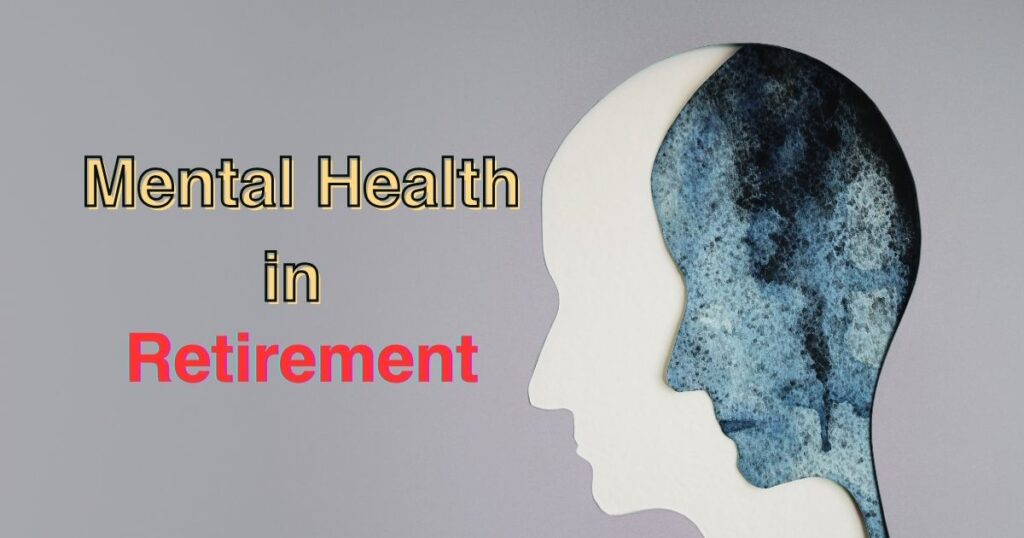Entering retirement sparks immense life changes and mental health in retirement plays an important role. While finance planning is imperative, equal priority must be placed on nurturing mental health to thrive in retirement’s evolving chapter.
In 2024 and beyond, a multi-faceted approach to mental health will be essential for retirees to realize fulfilling, engaged lifestyles aligned with their vision of purposeful aging. Retirement is often mythologized as the pinnacle of relaxation and carefree days.
In reality, the transition can trigger complex emotional responses from excitement to anxiety. Maintaining mental well-being requires proactivity. With average US life expectancy projected to exceed 80 years by 2030, much of one’s life may be spent in retirement. Taking steps to secure emotional health is vital. This article explores the keys to mental wellness in retirement’s dynamic new phase of discovery.
Common Mental Health Challenges
While retirement routines vary dramatically based on interests and resources, some underlying mental health patterns emerge:
Loneliness – With the loss of workplace social bonds and empty nests, loneliness affects 1 in 3 retirees. Efforts must be made to nurture meaningful connections.
Anxiety – Retirement’s drastic change, identity shifts, and uncertainty around aging can heighten anxiety without work routines. New pathways for the purpose must be forged.
Depression – Inadequate goals, activity, and social stimulation combined with age-related loss often precipitate depression affecting up to 5-10% of retirees.

Cognitive Decline – Mental stimulation is required to strengthen cognitive reserves and neural plasticity. Passivity can accelerate deterioration.
Substance Abuse – Overindulging in alcohol, prescription medications, or drugs to cope with emotional voids and change is a dangerous risk requiring awareness.
Sleep Disturbances – Disrupted sleep from restlessness or changing circadian rhythms directly impacts mental health. Proactive sleep hygiene habits help counter effects.
Targeted mental health strategies customized to individual needs become essential in retirement.
2024 Mental Health Trends and Insights
Several encouraging trends are emerging which will positively shape retiree mental health by 2024:
- Workplaces will normalize discussions of mental health through pervasive corporate wellness programs. Retirees will enter retirement better informed and more comfortable seeking help which remains stigmatized currently.
- Telepsychiatry and mental health apps will be covered more extensively by Medicare, reducing barriers to affordable therapy.
- Fitness trackers and smart devices will monitor biomarkers like sleep and activity levels to flag potential mental health deteriorations early when interventions are most effective.
- Neuroplasticity-optimized games and VR experiences will sharpen cognitive reserves helping aging minds stay nimble.
- Retirement facilities will integrate comprehensive emotional well-being programs spanning support groups, counseling, and environmental design.
- Intergenerational mentoring programs will combat isolation and forge a newfound purpose among retirees.
- Psychedelic-assisted therapies will gain traction for treatment-resistant depression and anxiety.

These positive advances will empower retirees to prioritize mental health.
Best Practices for Maintaining Mental Wellness
What proactive steps can retirees take in 2024 and beyond to sustain mental well-being?
Exercise and Nutrition – Daily movement, activity outdoors, and healthy diets boost endorphins, circulation, and energy levels while fighting inflammation.
Stress Management – Retirement-specific pressures require developing personalized relaxation skills through breathing, meditation, yoga, music, art, pets, nature, and calm environments.
Staying Cognitively Active – Never stop learning. Take classes, challenge thinking with puzzles/games, write memoirs, and master new technologies to keep the mind growing.
Meaningful Social Connections – Seek a balance of family bonds, friendships, intimacy, community groups, and intergenerational relationships filling emotional needs.
Finding Purpose and Growth – Continual discovery through volunteering, hobbies, cultural experiences, and passions provides meaning. Be open to evolution.
Professional Mental Health Support – Seek therapy, counseling, psychiatry, or support groups during difficult times or when needing motivation to progress.
With vigilance and compassion, mental health can thrive long after work identities fade.

Conclusion
The retirement transition marks a new frontier requiring mental resilience and adaptability. By 2024, cultural outlooks on emotional health will improve through openness, technology advances, tailored interventions, and reduced barriers. Still, realizing retirement’s full potential starts with prioritizing mental well-being through holistic self-care. Just as regular checkups monitor physical health, so must mental health be regularly nurtured. With sound emotional foundations and meaningful pursuits, the heart and mind will stay vital as retirement years pass. There is no better time than retirement to achieve harmony and enjoyment through all facets of health.
FAQs about Mental Health in Retirement
Why does mental health decline as people transition into retirement?
Retirement can trigger loss of purpose, loneliness from lost social bonds, anxiety over identity shifts, depression, and cognitive decline from lower activity.
What are some early signs retirees should watch for related to mental health?
Signs include mood changes, sleep pattern shifts, loss of motivation, isolation, lack of enjoyment, and memory/cognitive changes. Track biomarkers like sleep with technology.
What resources can help retirees care for their mental health?
Useful resources include therapy/counseling, support groups tailored to seniors, meditation/yoga, mental health apps, enrichment activities, fitness trackers, life coaches, and communities designed to nurture mental well-being.
What day-to-day strategies help promote positive mental health in retirement?
Helpful strategies include exercising, managing stress, staying socially engaged, learning new skills, establishing routines and goals, volunteering, spending time outdoors, eating well, and asking for help when needed.
Why will mental health become a bigger focus for retirees in the coming years?
Longer lifespans mean more years spent in retirement. Reduced stigma, better technology/data, and expanding retiree priorities will empower mental health maintenance.




